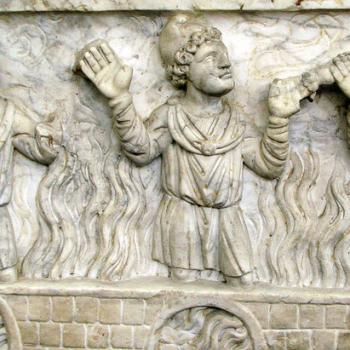
Power Corrupts
We need ministers, not leaders in the church. Admittedly, the words minister and leader may appear synonymous when referring to the organization of church polity. Still, the subtle difference can mean the difference between a healthy and a toxic church. The last decade witnessed the harm unchecked power and authority has within the church. Corrupt leaders have damaged the body of Christ and its witness to the world. Yet, in the Evangelical church, there is a strange fascination with powerful political men who can open doors of influence for the church to become more widely accepted into the larger culture.
Israel’s Desire for a King
The book of 1 Samuel illustrates the dangers of lusting for a mighty king. Samuel was plagued with two problems in his later years as the last judge of Israel. The first problem came from his family. Samuel’s appointing his firstborn and second-born sons as judges was a poor decision. There were signs of political corruption in their taking bribes and desire for dishonest gain. The second problem came from the people of Israel. Seeing the sin of his sons on full display, they wanted a king like the other nations had.
Doubtless, the perception of a strong leader imitating Samuel’s skill in guiding the nation of Israel was all too attractive to the people, and Samuel capitulated at God’s behest. Instead of seeking righteousness and crying to God on behalf of Samuel’s sons, they desire a mighty king like the other nations. Those living in Ancient Near East recognized kings not merely as governmental rulers but as vice-regents of the gods. They had power from the divine to rule in justice and equity. Submission to a king in this culture thus became synonymous with submission to a deity.
God recognized this idolatrous streak in the people from the day he led them out of Egypt. Thus, he gave them their desire warning them of the consequences of submission to a king instead of God. Sadly, Saul turned out to be a man whose physical appearance prioritized his moral character. Instead of obeying God by destroying the Amalekites and their livestock, he saved himself the best of the spoil. The greed which had characterized Samuel’s sons now reared its ugly head in the person of Saul.
Our Idols Look Like Us
Why is the church attracted to many influential leaders who fall in disgrace? We idolize those we think are speaking for God but only feed our inward lust for power. God rightly indicts the people of Israel for their rejection of Him. Israel wanted an influential leader who could bring them out from the shadows.
In the December 2019 issue of Rolling Stone magazine, an article entitled “False Idol – Why the Christian Right Worships Donald Trump” notes that in a survey of Protestant pastors, only 39 percent of evangelical pastors had planned to vote for him. However, after a pivotal meeting on September 26th, 2016, Trump persuaded a group of religious leaders that his vision for America was the same as theirs. Trump’s power in the White House could lead to an America that the evangelical based envisioned – one without Obamacare, the selection of “antichoice” judges, the eradication of the Johnson Amendment and support for prayer in school. When White Evangelical Christians went to the polls in November of that year, an overwhelming majority – 80% voted for him despite his blatantly immoral character.
Power, whether political or religious, always holds sway over our sinful hearts. We want to assume control through a leader who will act on our behalf. However, not all power inequities result from sin. Modern corporations encourage leaders to lead with strength and confidence. The team’s responsibility rests on the leader, and the team’s success relies on good leadership qualities. These qualities often involve good oratory skills and the ability to convince and persuade an audience. Successful leadership looks at the power of an individual or group to return a profit and often rewards those who can push their way to the top.
Leader vs Minister
In the last forty years, many churches began to model their growth strategy after the corporate model. Mega churches, once a rarity in the early ’70s, became the norm in many urban areas. Surveys revealed a need for the parishioner to experience a warm but familiar setting when assembling together on Sunday morning. Pastors spent less time visiting the sick and more time studying corporate leadership models and running their church as if they were a CEO. Why the shift? Perhaps surveys revealed church was too “stuffy” or “boring.” Maybe, there was a sense the church was weak, and the pastor who spent his time preparing for Sunday service or visiting the community needed help to run a “successful” church. After all, who doesn’t like numbers? If corporate America measures success by net profit, the attitude of many churches sees bodies in the pews as success. The shift from the small country or humble church to the mega-church saw a subtle yet profound change. I remember a time not many years ago when almost every member served in my small church. Whether we volunteered to help those in a community cleanup project or spent a Sunday afternoon in a local park telling people about Jesus, we were (for the most part) all involved.
In his book “Leadership,” Dr. Rollin Grams suggests that the persons listed in Ephesians 4:11 – apostles, pastors, and teachers before the 1980s were generally considered ministers. The semantic shift to leaders began soon after. Leadership, as Grams suggests, emphasizes gaining and using power. Ministry places emphasis on service. Even the term servant-leader is a misnomer suggesting leader as the defining characteristic only sugar-coated with an amiable Christ-like term to make the title more palatable. The leadership model is attractive insomuch as it gives power to certain church people. However, when leadership is the primary metaphor, we begin to see the fallout in abuses of power, infidelity, and moral decay. Samuel’s warning suggests that we may be to blame for elevating those with worldly ideals as leaders in the church. Perhaps we have lost faith in the power of God to lead His church as He sees fit.
One in Submission, One in Purpose
We need to change our perspective regarding the ministry of the church. As God has gifted each member, we should remember that gifts are primarily corporate. They are not to be idolized as “strengths.” Only Christ is our true leader. Jesus, in Matthew 23:8-12, warns the crowd and his disciples against using vocabulary that tends to elevate one’s status above another. Jesus equalizes the playing field when it comes to service to Him. When the body functions healthily by submitting to one another and Christ, all gifts work in harmony to bring glory to Christ and a witness to the world of God’s redeeming love. This call of servanthood is the call of the church. Let us be known for our love of servanthood, not our infatuation with powerful leaders.












